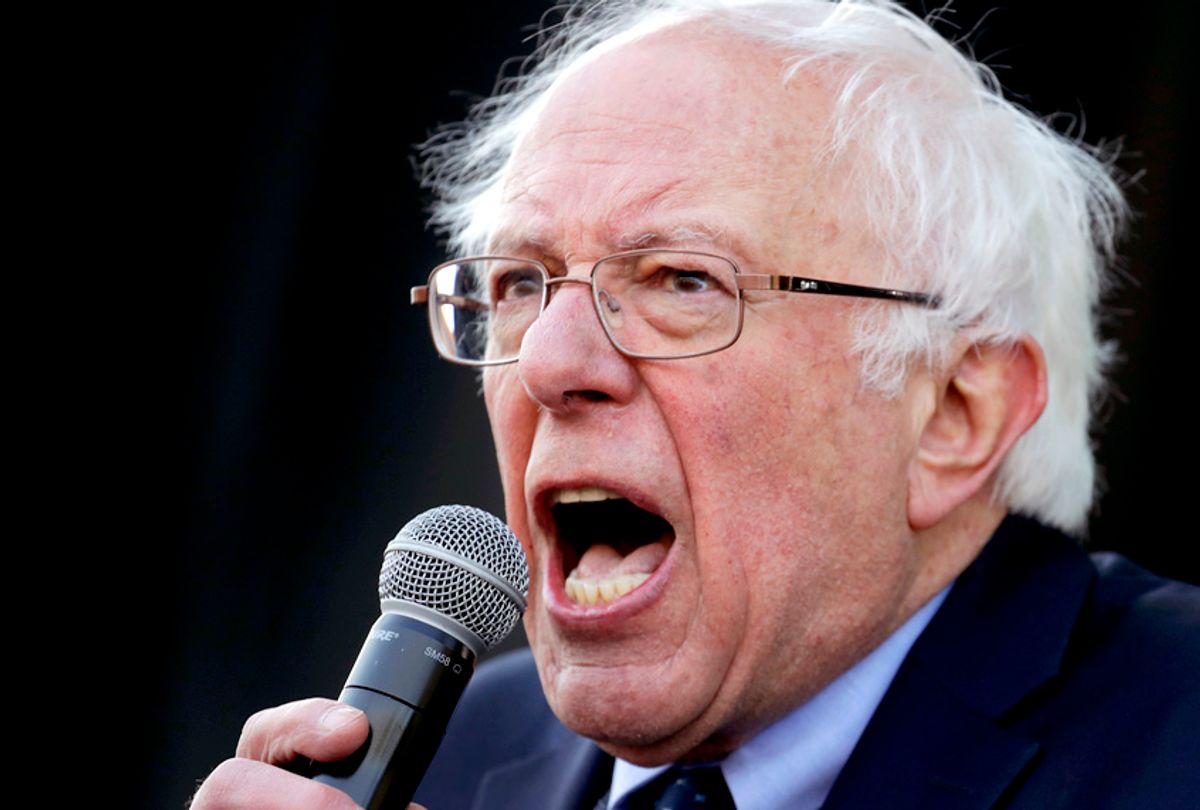Last week, Sen. Bernie Sanders, I-VT, said he plans to re-introduce legislation to raise the federal minimum wage from $7.25 to $15. But on Thursday, he announced a more a specific bill targeting the notoriously low wages at the retail giant Walmart and other huge companies with more than 500 employees.
Titled the "Stop Walmart Act," the bill would prohibit large companies from buying back stock unless all their employees are compensated a minimum wage of $15 an hour and allowed to accrue up to seven days of paid sick leave. It would also restrict the CEO's compensation, with a threshold of 150 times the median pay of its employees.
Sanders ripped into the Walmart franchise this week on Twitter, calling out the Walton family's wealth. He claimed that the family owns more wealth "than the bottom 40 percent of Americans. Meanwhile 55 percent of Walmart's associates are food insecure."
The Vermont senator also noted that, while Walmart claims it cannot afford to pay its employees $15 an hour, its CEO was compensated $22 million in 2017.
Walmart raised its minimum wage to $11 an hour this February and countered Sanders' depiction, claiming it offers competitive wages and benefits. "We have increased our starting wages by more than 50 percent in the last three years and currently have an average hourly total compensation of more than $17.50 an hour," the company said in a statement. "At the same time, we've also added new benefits like paid time off, advanced job training, paid family leave and college for $1 a day."
In September, Sanders successfully pressured Amazon to raise its minimum wage to $15 an hour after introducing the "Stop BEZOS Act," which would levy a tax on large companies "equal to the value of the public benefits that their workers receive," according to CNN. Shortly after he unveiled the bill, the online hub said it was raising its minimum wage to $15, beginning Nov. 1. Tucked away in Amazon's wage-increase announcement, however, was the fact that it was also stripping bonuses and stock awards for hourly workers.
Still, Sanders praised the move, telling reporters that some Amazon employees saw up to 50 percent pay increases. But he, along with Rep. Ro Khanna, D-Calif., who co-sponsored the Bezos bill, are now focused on other huge companies with the Stop Walmart Act, which would also affect McDonald's and American Airlines — U.S. corporations who rake in massive profits yet pay low wages.
"Critics say Sanders’s bill would constrict the flow of capital by preventing firms from buying back shares from their investors — money those investors then plow back into to the broader economy," the Washington Post reported. "Supporters say the plan would benefit a huge number of underpaid workers as the company’s founders, the Walton family, have seen their wealth balloon dramatically amid a broader increase of wealth inequality in the United States."
If passed, the legislation would affect nearly one million Walmart workers. And, while there is more of a chance of the bill's survival now that the Democrats control the House, Republicans still have a stronghold on the Senate and the White House, and both branches would likely block it once it reaches those chambers.
According to Ken Jacobs, chair of the University of California at Berkeley Labor Center, increasing Walmart's wages to $15 an hour would cost the company $3.8 billion, noting that Walmart announced last year that it would allow $20 billion in stock buybacks over two years.
"Overall, the cost to Walmart of doing this would be a tiny, tiny fraction of their revenues, while its impact on workers’ lives would be huge," Jacobs told The Post.



Shares